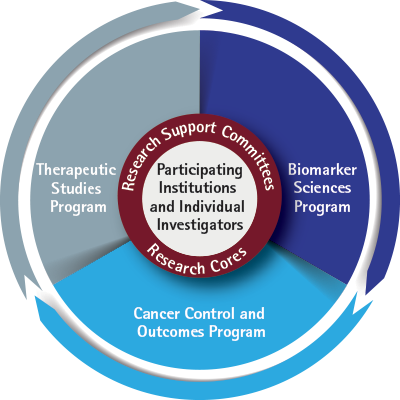Our Members
The ECOG-ACRIN Cancer Research Group (ECOG-ACRIN) is a multidisciplinary, membership-based scientific organization that designs and conducts biomarker-driven cancer research involving adults who have or are at risk of developing cancer. Our network of member institutions is a core component of the organization and our three scientific programs: Therapeutic Studies, Biomarker Sciences, and Cancer Control and Outcomes. The flexible structure of ECOG-ACRIN's membership program has resulted in a large network that provides substantial capabilities for the Group to carry out innovative research, whether in the form of a small, focused study at a single site or a large-scale population-based trial across multiple institutions.
Our Large Network is Strong across Community and Academic Programs
The ECOG-ACRIN member network comprises over 1400 participating institutions, including university schools of medicine, academic medical centers, National Cancer Institute-designated and other cancer centers, Lead Academic Participating Sites (LAPS), NCI Community Oncology Research Programs (NCORPs), Minority and Underserved NCORPs, health systems, community hospitals, clinics, imaging practices, and physician practices. In addition to its predominant base of sites in the United States, ECOG-ACRIN has participating sites in Argentina, Australia, Brazil, Canada, China, Germany, Ireland, Israel, Italy, Peru, South Africa, South Korea, and Spain.
A Flexible Membership Program Attracts Broad Participation
More than 21,000 individuals participate in ECOG-ACRIN through institutional membership. They have broad experience in clinical research disciplines and translational science. In clinical research, therapeutic and medical imaging disciplines include medical, surgical, and radiation oncology; hematology; radiology; nuclear medicine; internal medicine; and preventive medicine. In translational science, disciplines include laboratory-based pathology, genetics, molecular biology, and experimental imaging. Related disciplines include statistics, bioinformatics, clinical psychology, behavioral sciences, epidemiology, and health services.

